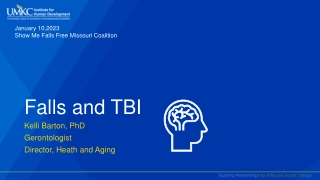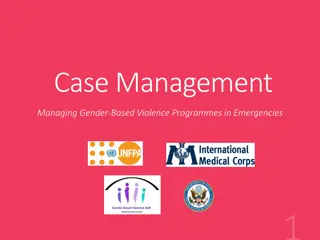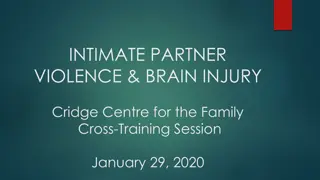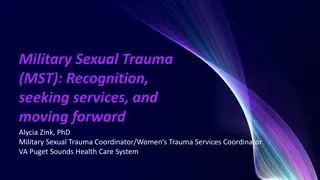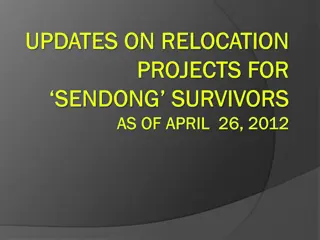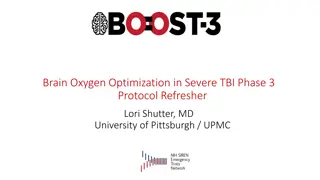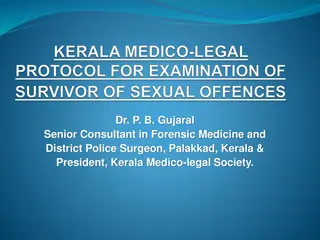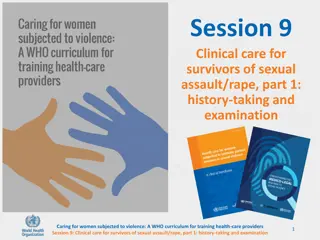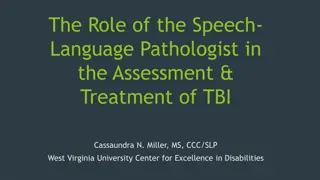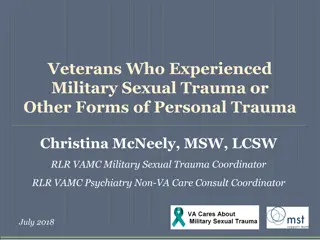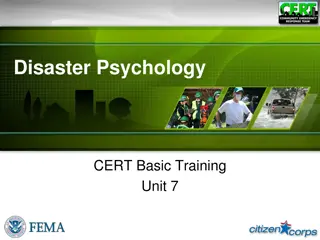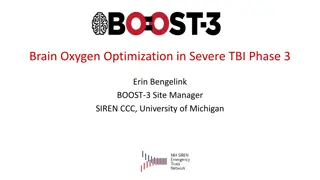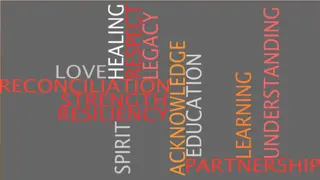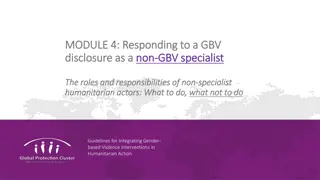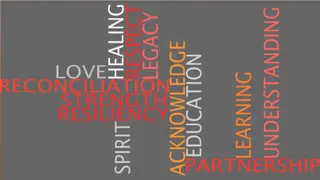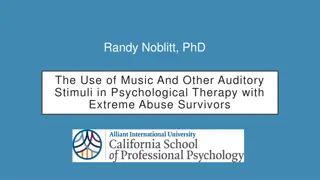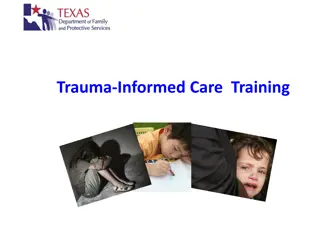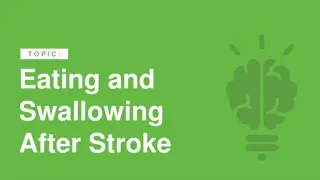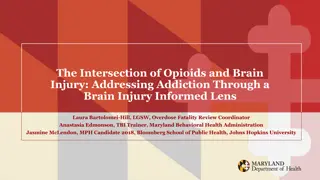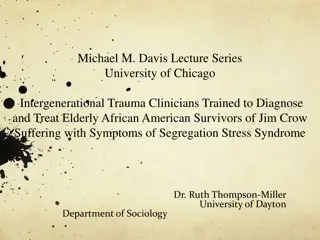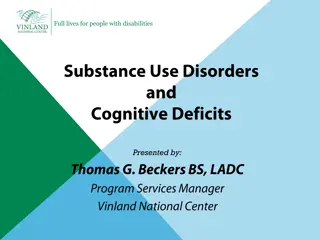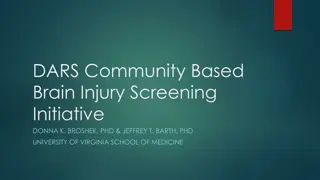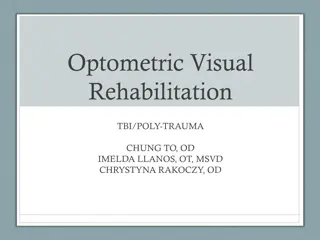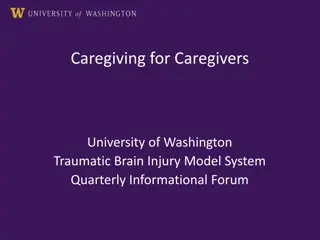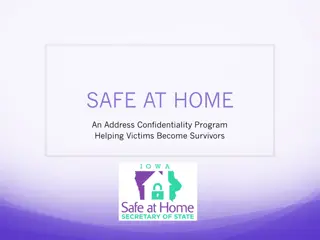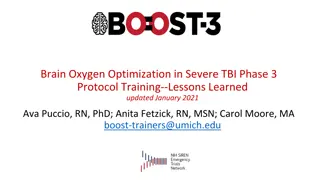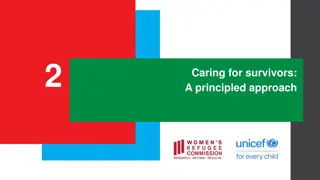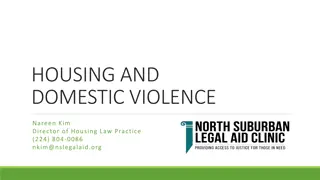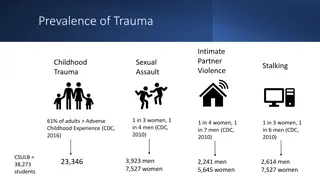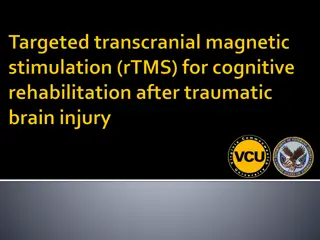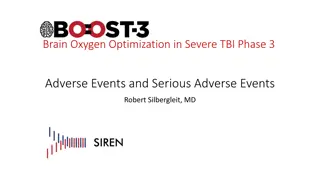Falls and TBI
January 10, 2023 Show Me Falls Free Missouri Coalition event to learn about TBI, falls, and aging. Presented by Kelli Barton, PhD, Gerontologist, Director of Health and Aging.
5 views • 15 slides
Understanding and Addressing Domestic Violence, Dating Violence, Sexual Assault, and Stalking
This training series focuses on raising awareness about domestic violence, dating violence, sexual assault, and stalking. Participants will learn how to recognize crisis and trauma, respond appropriately to disclosures, and create supportive environments for survivors. The sessions cover key topics
1 views • 76 slides
Impact of Family Violence on Housing and Support Services in Victoria
Family violence is a significant factor leading to homelessness in Victoria, particularly affecting women and young individuals. Safe at Home programs provide victim-survivors with support to remain in their homes while the perpetrator is removed. Brokerage services, such as flexible support package
5 views • 24 slides
Gender-Based Violence Case Management in Emergencies: Principles and Process
Gender-Based Violence (GBV) case management in emergencies involves a structured approach to supporting survivors by ensuring informed decision-making, identification of issues, and emotional support. The process prioritizes survivor empowerment, individualized service delivery, and coordination. Ke
5 views • 73 slides
Mandatory Recourse Program for Rape Survivors in South Africa: Social Work Perspective
Addressing the alarming rates of rape and sexual violence in South Africa, this paper advocates for the implementation of a mandatory recourse program to support victims and survivors. Highlighting the current lack of mandatory support for survivors, it emphasizes the importance of immediate recours
1 views • 10 slides
Understanding Intimate Partner Violence and Brain Injury Connections
The link between intimate partner violence (IPV) and brain injury is significant, with studies showing a high prevalence of brain injuries among IPV survivors, particularly women. Common types of IPV causing brain injury include hits to the head, strangulation, and banging the head against objects.
1 views • 23 slides
Understanding Military Sexual Trauma (MST) and Supporting Survivors
This presentation by Dr. Alycia Zink delves into Military Sexual Trauma (MST), covering definitions, statistics, unique aspects in military settings, common reactions like PTSD, and available mental health treatments for survivors. Participants will gain insight into recognizing MST, understanding s
0 views • 39 slides
Update on Sendong Survivors' Relocation Projects as of April 26, 2012
Ongoing relocation projects for Sendong survivors include developments in Bayanihan sa Iligan Village, Deus Caritas Est Village, Kapuso Village, Red Cross Village, Iligan Eco Village, and Upper Hinaplanon Heights. The activities involve house constructions, land surveys, site development funds, wate
1 views • 11 slides
Brain Oxygen Optimization in Severe TBI - Protocol Summary
In the severe traumatic brain injury (TBI) protocol, intracranial monitors measuring ICP and PbtO2 are placed within 12 hours of injury. Procedures include FiO2 challenges to check PbtO2 reliability and assess cerebral physiology. Challenges involving FiO2, MAP, and CO2 help guide ventilator setting
2 views • 27 slides
Comprehensive Approach to Address Sexual Offences: Insights from Dr. P. B. Gujaral
Dr. P. B. Gujaral, a Senior Consultant in Forensic Medicine, highlights the significant impact of sexual offences, emphasizing the need for a thorough medico-legal examination and comprehensive care for survivors. He discusses the existing protocols, identifying fatal mistakes, and the evolution of
0 views • 10 slides
Clinical Care for Survivors of Sexual Assault/Rape: History-Taking and Examination
This session focuses on providing clinical care for survivors of sexual assault/rape, emphasizing the importance of history-taking, examination, and appropriate responses. Key aspects include taking a thorough history, conducting physical and forensic examinations when necessary, offering necessary
0 views • 16 slides
Speech-Language Pathologist's Role in TBI Assessment & Treatment
Speech-language pathologists play a crucial role in assessing and treating traumatic brain injuries (TBI) which affect millions annually, with significant impact on children. SLPs collaborate with medical specialists, provide screenings, comprehensive evaluations, treatment development, and advocacy
0 views • 44 slides
Understanding Military Sexual Trauma (MST) and Supporting Veterans
This presentation by Christina McNeely provides valuable insights into military sexual trauma (MST) experienced by veterans, highlighting the definitions, prevalence, impacts, and the VA's response. It explores how MST differs from other traumas, addresses the needs of survivors during the claims pr
0 views • 35 slides
Understanding Disaster Psychology and Rescuer Well-Being
Explore the key concepts of disaster psychology, focusing on the emotional environment of survivors and rescuers. Discover ways rescuers can alleviate stress for themselves and survivors. Learn about symptoms of trauma, both psychological and physiological, and actions to enhance team well-being bef
0 views • 22 slides
Understanding Ritual Abuse and Survivor Support: A Historical Perspective
Explore the history of ritual abuse and its effects on survivors through the lens of social movements. Learn from Neil Brick's insights on survivor support systems and recovery. Delve into key periods in the history of child and ritualistic abuse, shedding light on the brutal nature of these crimes
1 views • 88 slides
Brain Oxygen Optimization in Severe TBI Phase 3: BOOST-3 Study Details at University of Michigan
Explore the BOOST-3 trial led by Erin Bengelink, focusing on brain oxygen optimization in severe Traumatic Brain Injury (TBI) Phase 3. Discover study materials, milestones, regulatory parameters, and training resources to facilitate your involvement in this crucial research project. Access the BOOST
1 views • 22 slides
Understanding Orange Shirt Day: Commemorating Residential School Survivors
Orange Shirt Day is a national initiative in Canada that aims to honor survivors of Indian Residential Schools and remember those who did not return home. The movement began in 2013 and encourages Canadians to wear orange shirts on September 30 as a gesture of healing and reconciliation. Phyllis Web
0 views • 18 slides
Guidelines for Survivor-Centered Approach in Responding to Gender-Based Violence
Survivor-centered approach in responding to gender-based violence focuses on creating a supportive environment where survivors' rights are respected, promoting recovery, reinforcing decision-making capacity, and ensuring dignity and respect. It involves addressing victim-blaming attitudes, empowerin
0 views • 28 slides
Overcoming Barriers to Disclosure of Sexual Violence
Understanding the barriers to disclosing sexual violence is crucial in providing support to survivors. Common obstacles include self-blame, fear of not being believed, and concerns about judgment from others. This case study illustrates challenges faced by a woman who was sexually assaulted and high
3 views • 9 slides
Understanding Orange Shirt Day: Honoring Residential School Survivors
Orange Shirt Day is a national movement in Canada to recognize and honor the experience of students of Indian Residential Schools. It began in 2013 to acknowledge survivors and remember those who did not return home. Phyllis Webstad's story of losing her orange shirt at a residential school highligh
1 views • 18 slides
The Use of Music and Auditory Stimuli in Psychological Therapy with Extreme Abuse Survivors
Extreme abuse survivors often find solace and emotional regulation through music and other auditory stimuli, which can evoke various responses such as containment, identity switching, and flashbacks. Despite being less discussed in clinical literature, these stimuli play a crucial role in therapy wi
0 views • 27 slides
Understanding Trauma-Informed Care Training
Trauma-Informed Care Training involves understanding child traumatic stress, recognizing the effects of trauma on child development, behaviors, and functioning, as well as preventing and coping with Compassion Fatigue. It emphasizes creating safety for both providers and survivors and empowering sur
0 views • 55 slides
Managing Eating and Swallowing Challenges After Stroke
Dysphagia, a common issue after a stroke, can lead to difficulty swallowing and may require texture modifications in food and fluids for safety. Up to 65% of stroke survivors may experience dysphagia, which can lead to complications like pneumonia. Proper oral care, mealtime positioning, and awarene
0 views • 9 slides
The Intersection of Opioids and Brain Injury: Addressing Addiction Through a Brain Injury Informed Lens
Exploring the correlation between traumatic brain injury (TBI) and the opioid crisis, this content delves into the alarming statistics of opioid overdoses and their impact on individuals with brain injuries. Highlighting the overlap and consequences of these two major health issues, it sheds light o
0 views • 45 slides
Management of Closed Head Injuries in an Austere Environment Overview
Understanding the pathophysiology of brain injuries, including intracranial pressure changes and specific injuries such as traumatic brain injury (TBI), skull fractures, brain bleeds, and diffuse axonal injuries. It covers classifications, diagnosis, and treatment approaches for mild/concussion, mod
0 views • 27 slides
Business Plan for Incubation at FIST-TBI, IIT Patna
Providing a comprehensive format for a business plan tailored for incubation at FIST-TBI, IIT Patna, focusing on mandatory sections, value proposition, and key considerations for potential applicants. The format aims to guide entrepreneurs in presenting their ideas and business concepts in a concise
0 views • 14 slides
Intergenerational Trauma: Coping Strategies of Elderly African American Survivors of Jim Crow
Exploring coping strategies passed down by survivors of Jim Crow to the next generation, this qualitative research project conducted interviews with nearly 100 elderly African American survivors. Key findings reveal the long-term psychological impact of racially traumatic events and diverse coping m
0 views • 27 slides
Full Lives for People with Disabilities - Addressing Traumatic Brain Injury
Traumatic Brain Injury (TBI) presents a significant public health concern in the United States, often termed as the silent epidemic due to its hidden nature. This condition affects thinking and memory, impacting individuals' lives profoundly. Resources such as "The Essential Brain Injury Guide" shed
0 views • 23 slides
Community-Based Brain Injury Screening Initiative at University of Virginia School of Medicine
Screening for traumatic brain injury (TBI) is crucial for identifying individuals with chronic TBI symptoms that impact productivity and social integration. The initiative aims to develop a brief, easy-to-administer TBI screening measure to assist community health organizations in identifying and re
0 views • 13 slides
Cognitive and Behavioral Management Strategies for Traumatic Brain Injury Patients
This presentation focuses on addressing challenging cognitive, behavioral, and personality issues associated with traumatic brain injury (TBI). It outlines cognitive issues such as attention, speed of processing, learning, memory, and executive functioning. Cognitive management strategies include te
0 views • 18 slides
Optometric Visual Rehabilitation for TBI/Poly-Trauma Patients: Principles and Considerations
Optometric Visual Rehabilitation involves the comprehensive treatment of visual system disorders, including binocular vision, accommodation issues, and more. Neural plasticity plays a key role in neuro-rehabilitation, allowing the brain to adapt and learn. The 10 principles of neural plasticity guid
0 views • 29 slides
Understanding Caregiving for Traumatic Brain Injury Survivors
Caregiving for individuals with Traumatic Brain Injury (TBI) is a crucial yet challenging role undertaken by family members or friends. The responsibilities can be overwhelming, impacting both the survivor and the caregiver's well-being. This presentation highlights the needs of caregivers, survivor
0 views • 22 slides
DOR Update and TBI Subcommittee Meetings - April 11, 2024
Department of Rehabilitation's latest updates include changes to its name, seeking feedback for a new name, staffing details, TBI State Partnership Program grants, and TBI Providers information. The TBI Subcommittee is enhancing services for survivors and caregivers to promote partnerships and infor
0 views • 17 slides
A Confidentiality Program Helping Victims Become Survivors
Safe at Home is an address confidentiality program aiding victims of domestic abuse, sexual assault, trafficking, and violent crimes to transition into survivors. It offers services like Substitute Address, Mail Forwarding, and Confidential Voter Registration. Eligible individuals can apply, includi
0 views • 36 slides
Lessons Learned in Brain Oxygen Optimization for Severe TBI Phase 3 Protocol
Screening, enrollment, and inclusion/exclusion criteria insights for the Brain Oxygen Optimization in Severe Traumatic Brain Injury (TBI) Phase 3 Protocol are discussed. Key points include handling urgent patient queries, guidelines on hypotension and hypoxia, pupil assessment considerations, and su
0 views • 20 slides
Empowering Survivors: A Principled Approach Through Self-Reflection and Values Clarification
Empower survivors by debunking myths, promoting self-reflection, and adopting a survivor-centered approach. Understand the influence of personal values, biases, and behaviors in supporting survivors' recovery and agency. Embrace neutrality, self-awareness, and survivor-centric actions to ensure dign
0 views • 23 slides
Understanding Subsidized Housing Programs for Domestic Violence Survivors
Domestic violence often leads to housing instability, making it crucial for survivors to access safe housing. This article explores the intersection between domestic violence and housing, highlighting the barriers faced by survivors. It delves into the importance of subsidized housing programs, such
0 views • 34 slides
Understanding Trauma and Social Reactions in Cases of Violence
This content highlights the prevalence of trauma, including intimate partner violence, childhood trauma, sexual assault, and stalking. It discusses disclosures to friends and family, social reactions survivors may face, victim blame, and the importance of providing support and understanding to survi
0 views • 10 slides
Cognitive Deficits and Treatment Options Following Traumatic Brain Injury
Traumatic Brain Injury (TBI) can lead to a range of cognitive deficits and long-term complications, affecting communication, sensory perception, behavior, and more. Severe TBI is associated with EEG frequency shifts and cognitive impairments similar to Alzheimer's disease and schizophrenia. While tr
0 views • 34 slides
Brain Oxygen Optimization in Severe TBI: Adverse Events Analysis
This study led by Dr. Robert Silbergleit focuses on adverse events in brain oxygen optimization for severe Traumatic Brain Injury (TBI) patients. It outlines key points for reporting adverse events, discusses relatedness algorithms, and presents scenarios to analyze adverse events occurrence post-en
0 views • 24 slides
